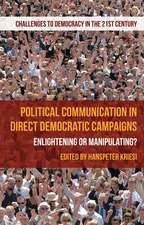Young People’s Voting Behaviour in Europe: A Comparative Perspective
Autor Nicola Magginien Limba Engleză Hardback – 31 ian 2017
| Toate formatele și edițiile | Preț | Express |
|---|---|---|
| Paperback (1) | 412.13 lei 6-8 săpt. | |
| Palgrave Macmillan UK – 3 mai 2018 | 412.13 lei 6-8 săpt. | |
| Hardback (1) | 418.29 lei 6-8 săpt. | |
| Palgrave Macmillan UK – 31 ian 2017 | 418.29 lei 6-8 săpt. |
Preț: 418.29 lei
Nou
Puncte Express: 627
Preț estimativ în valută:
80.05€ • 83.26$ • 66.09£
80.05€ • 83.26$ • 66.09£
Carte tipărită la comandă
Livrare economică 15-29 aprilie
Preluare comenzi: 021 569.72.76
Specificații
ISBN-13: 9781137592422
ISBN-10: 1137592427
Pagini: 144
Ilustrații: XIV, 145 p. 16 illus.
Dimensiuni: 148 x 210 x 11 mm
Greutate: 0.35 kg
Ediția:1st ed. 2017
Editura: Palgrave Macmillan UK
Colecția Palgrave Macmillan
Locul publicării:London, United Kingdom
ISBN-10: 1137592427
Pagini: 144
Ilustrații: XIV, 145 p. 16 illus.
Dimensiuni: 148 x 210 x 11 mm
Greutate: 0.35 kg
Ediția:1st ed. 2017
Editura: Palgrave Macmillan UK
Colecția Palgrave Macmillan
Locul publicării:London, United Kingdom
Cuprins
Introduction.- 1. Age, generations and voting behaviour.- 2. Young people, politics and vote between continuity and change.- 3. The explanatory model: the determinants of youth voting choices.- 4. Conclusions.
Notă biografică
Nicola Maggini is Research Fellow at the University of Florence, Italy, and a member of CISE (Italian Centre for Electoral Studies). He has published on Italian and international scientific journals and co-edited several volumes for the Dossier CISE series. His research focuses on socio-political attitudes and voting behaviour in a comparative perspective.
Textul de pe ultima copertă
‘This book provides a methodologically rigorous analysis that sheds new light on the young peoples' voting behaviour in Western Europe. A great reference for academics, practitioners, and students.’ – Professor Alessandro Chiaramonte, University of Florence, Italy, & New York University, USA
This book uses various concepts of ‘age’ to examine young people’s voting behaviour in six European countries between 1981 and 2000. It addresses questions such as: what are the determinants of voting choices among young people, and to what extent are these factors different from those of adults? Through an innovative approach aimed at studying party choice with a strong empirical orientation, the author argues that age is less important in influencing voting choices than having been young and socialized to politics in a given historical period. Ultimately, values and political factors explain young people’s voting choices more than social identities, which marks a change from previous generations. This book will appeal to students and scholars in comparative politics, electoral behaviour, party politics, and political sociology.
Nicola Maggini is Research Fellow at the University of Florence, Italy, and a member of CISE (Italian Centre for Electoral Studies). He has published on Italian and international scientific journals and co-edited several volumes for the Dossier CISE series. His research focuses on socio-political attitudes and voting behaviour in a comparative perspective.
This book uses various concepts of ‘age’ to examine young people’s voting behaviour in six European countries between 1981 and 2000. It addresses questions such as: what are the determinants of voting choices among young people, and to what extent are these factors different from those of adults? Through an innovative approach aimed at studying party choice with a strong empirical orientation, the author argues that age is less important in influencing voting choices than having been young and socialized to politics in a given historical period. Ultimately, values and political factors explain young people’s voting choices more than social identities, which marks a change from previous generations. This book will appeal to students and scholars in comparative politics, electoral behaviour, party politics, and political sociology.
Nicola Maggini is Research Fellow at the University of Florence, Italy, and a member of CISE (Italian Centre for Electoral Studies). He has published on Italian and international scientific journals and co-edited several volumes for the Dossier CISE series. His research focuses on socio-political attitudes and voting behaviour in a comparative perspective.
Caracteristici
Makes a signifciant contribution to our understanding of young people's political behaviour in Europe Compartively studies six countries using theoretical reasoning and detailed empirical accounts of specific voting models Addresses the political socialization of young people and their relationship with previous generations















